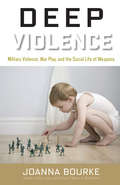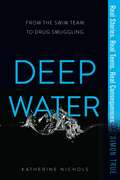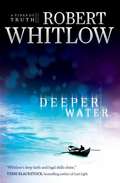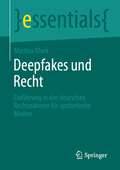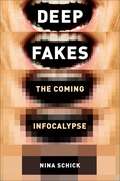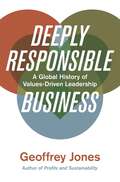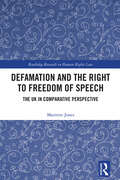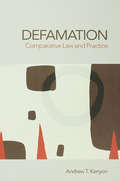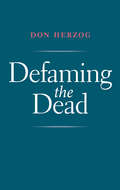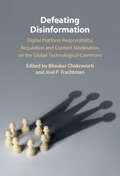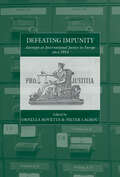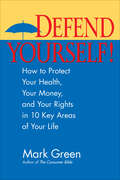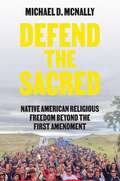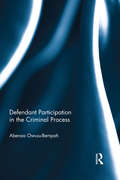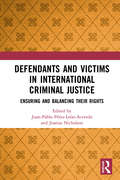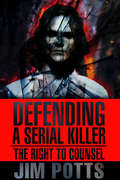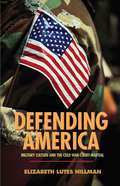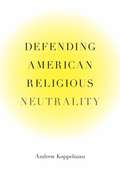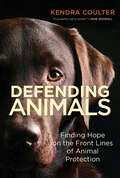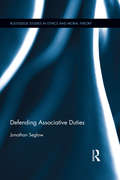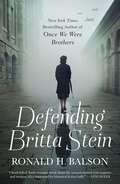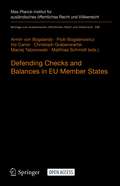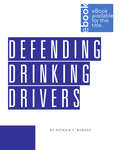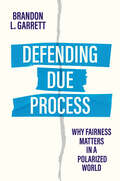- Table View
- List View
Deep Violence: Military Violence, War Play, and the Social Life of Weapons
by Joanna Bourke2014 marks the 100th anniversary of the declaration of the First World War, and with it comes a deluge of books, documentaries, feature films and radio programs. We will hear a great deal about the horror of the battlefield. Bourke acknowledges wider truths: war is unending and violence is deeply entrenched in our society. But it doesn't have to be this way. This book equips readers with an understanding of the history, culture and politics of warfare in order to interrogate and resist an increasingly violent world.Wounding the World investigates the ways that violence and war have become internalized in contemporary human consciousness in everything from the way we speak, to the way our children play with one another, to the way that we ascribe social characteristics to our guns and other weapons. With a remarkable depth of insight, Bourke argues for a radical overhaul of our collective stance towards militarism from one that simply aims to reduce violence against people to one that would eradicate all violence. Her message is judicious and vital: knowledge about weapons and the violence they bring has simply become too important to cast aside or leave to the experts.
Deep Water (Simon True #1)
by Katherine NicholsReal stories. Real teens. Real crimes. A group of teens traffic drugs between Mexico and California in this start to the brand-new Simon True series.It&’s 1971 in Coronado, a small southern California beach town. For seventeen-year-old Eddie Otero, a skilled waterman and avid surfer, life is simple. Then a friend makes him an offer: Swim an illicit package across the border from Mexico. The intense workout is dangerous. Thrilling. Lucrative. And the beginning of a small business. When the young entrepreneurs involve their former high school Spanish teacher, the smuggling adventure grows into a one hundred million dollar global operation. Soon they become fugitives. Living on the edge, they vow to return to their normal lives—right after one last run…
Deeper Water (Tides of Truth, Book #1)
by Robert WhitlowBack Cover The Tides of Truth novels follow one lawyer's passionate pursuit of truth in matters of life and the law. In the murky waters of Savannah's shoreline, a young law student is under fire as she tries her first case at a prominent and established law firm. A complex mix of betrayal and deception quickly weaves its way through the case and her life, as she uncovers dark and confusing secrets about the man she's defending-and the senior partners of the firm. How deep will the conspiracy run? Will she have to abandon her true self to fulfill a higher calling? And how far will she have to go to discover the truth behind a tragic cold case?
Deepfakes und Recht: Einführung in den deutschen Rechtsrahmen für synthetische Medien (essentials)
by Martina BlockWelche Möglichkeiten gibt es, sich vor den Gefahren von Deepfakes – also künstlich erstellten oder manipulierten Inhalten – zu schützen? In diesem Buch werden Anwendungsbereiche von Deepfakes dargestellt und die technischen Grundlagen zur Erstellung und Aufdeckung von Deepfakes vorgestellt.Es wird eine Einordnung in die verschiedenen Bereiche des deutschen Rechts (allgemeines Zivilrecht, Urheberrecht und Strafrecht) vorgenommen. Hierbei liegt ein besonderes Augenmerk darauf, welche Rechtsschutzmöglichkeiten Betroffenen – also Personen, die gegen ihren Willen abgebildet werden – zustehen und welche Hindernisse bei der Durchsetzung dieser Ansprüche bestehen können. Anschließend wird der Entwurf für eine europäische Verordnung über Künstliche Intelligenz (AI Act) – mit einem Fokus auf die für Deepfakes geltenden Offenlegungsvorschriften – vorgestellt.
Deepfakes: The Coming Infocalypse
by Nina SchickEverything you need to know about "deepfakes" and what could become the biggest information and communications meltdown in world history.In a world of deepfakes, it will soon be impossible to tell what is real and what isn't. As advances in artificial intelligence, video creation, and online trolling continue, deepfakes pose not only a real threat to democracy -- they threaten to take voter manipulation to unprecedented new heights. This crisis of misinformation which we now face has since been dubbed the "Infocalypse."In DEEPFAKES, investigative journalist Nina Schick uses her expertise from working in the field to reveal shocking examples of deepfakery and explain the dangerous political consequences of the Infocalypse, both in terms of national security and what it means for public trust in politics. This all-too-timely book also unveils what this all means for us as individuals, how deepfakes will be used to intimidate and to silence, for revenge and fraud, and just how truly unprepared governments and tech companies are for what's coming.
Deeply Responsible Business: A Global History of Values-Driven Leadership
by Geoffrey JonesCorporate social responsibility has entered the mainstream, but what does it take to run a successful purpose-driven business? A Harvard Business School professor examines leaders who put values alongside profits to showcase the challenges and upside of deeply responsible business.For decades, CEOs have been told that their only responsibility is to the bottom line. But consensus is that companies—and their leaders—must engage with their social and environmental contexts. The man behind one of Harvard Business School's most popular courses, Geoffrey Jones distinguishes deep responsibility, which can deliver radical social and ecological responses, from corporate social responsibility, which is often little more than window dressing.Deeply Responsible Business offers an invaluable historical perspective, going back to the Quaker capitalism of George Cadbury and the worker solidarity of Edward Filene. Through a series of in-depth profiles of business leaders and their companies, it carries us from India to Japan and from the turmoil of the nineteenth century to the latest developments in impact investing and the B-corps. Jones profiles business leaders from around the world who combined profits with social purpose to confront inequality, inner-city blight, and ecological degradation, while navigating restrictive laws and authoritarian regimes.He found that these leaders were motivated by bedrock values and sometimes—but not always—driven by faith. They chose to operate in socially productive fields, interacted with humility with stakeholders, and felt a duty to support their communities. While far from perfect—some combined visionary practices with vital flaws—each one showed that profit and purpose could be reconciled. Many of their businesses were highly successful—though financial success was not their only metric of achievement.As companies seek to coopt ethically sensitized consumers, Jones gives us a new perspective to tackle tough questions. Inspired by these passionate and pragmatic business leaders, he envisions a future in which companies and entrepreneurs can play a key role in healing our communities and protecting the natural world.
Deepwater Horizon
by James M. Blossom Earl BoebertIn 2010 BP's Deepwater Horizon catastrophe spiraled into the worst human-made economic and ecological disaster in Gulf Coast history. In the most comprehensive account to date, senior systems engineers Earl Boebert and James Blossom show how corporate and engineering decisions, each one individually innocuous, interacted to create the disaster.
Defamation and the Right to Freedom of Speech: The UK in Comparative Perspective (Routledge Research in Human Rights Law)
by Mariette JonesIn an effort to balance the protection of reputation and the right to free speech, the UK Parliament attempted to fundamentally transform English libel law through the Defamation Act 2013. This book evaluates the success of this attempt by means of a comparative analysis of relevant law in the United States of America (US), Germany, and the European Court of Human Rights. It examines the reasons that it was deemed necessary to reform the common law of defamation in England and Wales, the changes wrought by the act, and the case law it has engendered. As defamation often occurs internationally, the book also takes a broad comparative look at the way in which other relevant jurisdictions attempt to balance reputational protection and free speech. The natural starting point is the US where freedom of expression is strongly protected by the US Constitution. From there the focus shifts to Germany where both competing legal interests are likewise given constitutional protection. The European Court of Human Rights’ jurisprudence is also examined because of its highly developed balancing approach and its general reflection of European legal thinking. Recent high-profile defamation cases such as those concerning the actors Johnny Depp and Amber Heard, decided in the UK as well as the US, form interesting and informative case studies. The final section of the work rates the libel reform attempted in the UK against its own benchmarks, provides suggestions about the way in which it is developing, and concludes that valuable lessons can still be learnt from the comparator jurisdictions. The book will be essential reading for those working in the areas of human rights law and media law.
Defamation: Comparative Law and Practice
by Andrew KenyonDefamation: Comparative Law and Practice offers a timely and original investigation into defamation law and litigation practice in England, Australia and the United States, combining close legal analysis and extensive empirical research to examine central aspects of defamation law. This groundbreaking contribution to legal knowledge will be useful to researchers, academics, students and practitioners working in media and communications law. It will enable lawyers outside the US to make more informed use of US law and commentary and it sets out, in an accessible manner, the intricacies of English and Australian defamation law and practice for US legal readers.
Defaming the Dead
by Don HerzogDo the dead have rights? In a persuasive argument, Don Herzog makes the case that the deceased's interests should be protected This is a delightfully deceptive works that start out with a simple, seemingly arcane question--can you libel or slander the dead?--and develops it outward, tackling larger and larger implications, until it ends up straddling the borders between law, culture, philosophy, and the meaning of life. A full answer to this question requires legal scholar Don Herzog to consider what tort law is actually designed to protect, what differences death makes--and what differences it doesn't--and why we value what we value. Herzog is one of those rare scholarly writers who can make the most abstract argument compelling and entertaining.
Defeating Disinformation: Digital Platform Responsibility, Regulation and Content Moderation on the Global Technological Commons
by Joel P. Trachtman Bhaskar ChakravortiGlobal platforms present novel challenges. They are powerful conduits of commerce and global community, and their potential to influence behavior is enormous. Defeating Disinformation explores how to balance free speech and dangerous online content to reduce societal risks of digital platforms. The volume offers an interdisciplinary approach, drawing upon insights from different geographies and parallel challenges of managing global phenomena with national policies and regulations. Chapters also examine the responsibility of platforms for their content, which is limited by national laws such as Section 230 of the Communications Decency Act in the US. This balance between national rules and the need for appropriate content moderation threatens to splinter platforms and reduce their utility across the globe. Timely and expansive, Defeating Disinformation develops a global approach to address these tensions while maintaining, and even enhancing, the social contribution of platforms. This title is also available as open access on Cambridge Core.
Defeating Impunity: Attempts at International Justice in Europe since 1914 (War and Genocide #33)
by Pieter Lagrou Ornella RovettaOver the course of the long and violent twentieth century, only a minority of international crime perpetrators ever stood trial, and a central challenge of this era was the effort to ensure that not all these crimes remained unpunished. This required not only establishing a legal record but also courage, determination, and inventiveness in realizing justice. Defeating Impunity moves from the little-known trials of the 1920s to the Yugoslavia tribunal in the 2000s, from Belgium in 1914 to Ukraine in 1943, and to Stuttgart and Düsseldorf in 1975. It illustrates the extent to which the language of law drew an international horizon of justice.
Defend Yourself!: How to Protect Your Health, Your Money, And Your Rights in 10 Key Areas of Your Life
by Mark J. GreenTalk Back / Fight BackPatient, client, employee, small business owner, taxpayer, investor, consumer—it's time to defend yourself! Why should anyone tolerate an HMO not paying for his emergency surgery because he didn't give notice beforehand or accept a higher auto insurance rate because she lives in a low-income community? A large body of laws and regulations exists to give average workers and consumers the tools to talk back and fight back.
Defend the Sacred: Native American Religious Freedom beyond the First Amendment
by Michael D. McNallyThe remarkable story of the innovative legal strategies Native Americans have used to protect their religious rightsFrom North Dakota's Standing Rock encampments to Arizona's San Francisco Peaks, Native Americans have repeatedly asserted legal rights to religious freedom to protect their sacred places, practices, objects, knowledge, and ancestral remains. But these claims have met with little success in court because Native American communal traditions don't fit easily into modern Western definitions of religion. In Defend the Sacred, Michael McNally explores how, in response to this situation, Native peoples have creatively turned to other legal means to safeguard what matters to them.To articulate their claims, Native peoples have resourcefully used the languages of cultural resources under environmental and historic preservation law; of sovereignty under treaty-based federal Indian law; and, increasingly, of Indigenous rights under international human rights law. Along the way, Native nations still draw on the rhetorical power of religious freedom to gain legislative and regulatory successes beyond the First Amendment.The story of Native American advocates and their struggle to protect their liberties, Defend the Sacred casts new light on discussions of religious freedom, cultural resource management, and the vitality of Indigenous religions today.
Defendant Participation in the Criminal Process
by Abenaa Owusu- BempahRequirements for the defendant to actively participate in the English criminal process have been increasing in recent years such that the defendant can now be penalised for their non-cooperation. This book explores the changes to the defendant’s role as a participant in the criminal process and the ramifications of penalising a defendant’s non-cooperation, particularly its effect on the adversarial system. The book develops a normative theory which proposes that the criminal process should operate as a mechanism for calling the state to account for its accusations and request for official condemnation and punishment of the accused. It goes on to examine the limitations placed on the privilege against self-incrimination, the curtailment of the right to silence, and the defendant’s duty to disclose the details of his or her case prior to trial. The book shows that, by placing participatory requirements on defendants and penalising them for their non-cooperation, a system of obligatory participation has developed. This development is the consequence of pursuing efficient fact-finding with little regard for principles of fairness or the rights of the defendant.
Defendants and Victims in International Criminal Justice: Ensuring and Balancing Their Rights
by Joanna Nicholson Juan-Pablo Pérez-León-AcevedoThis volume considers a variety of key issues pertaining to the rights of defendants and victims at International Criminal Courts (ICTs) and explores how best to balance and enhance the rights of both in order to ensure the effectiveness and efficiency of international criminal proceedings. The rights of victims are becoming an increasingly important issue at ICTs. Yet, at the same time, this has to be achieved without having a detrimental impact upon on the rights of the defence and the efficiency of the courts. This book provides analyses of issues on the rights of both the accused and the victims. By discussing matters concerning these two pivotal actors in international criminal justice within the same volume, the work highlights that there are intrinsic and intense conflicting and converging relationships between victims and the accused, particularly in terms of their rights. While most of the chapters focus mainly on either the accused or the victims, others discuss both at the same time. The work strikes a fine balance between, on the one hand, classic topics on the rights of the accused and the rights of the victims and, on the other, topics which have been largely unexplored and/or which require new angles or perspectives. Additionally, there are some chapters which approach both the rights of the accused and the rights of the victims in new contexts and/or under novel perspectives. The book as a whole provides a discussion of the two sides of this important coin of international criminal justice. The work will be an essential resource for academics, practitioners and students with an interest in the field of international criminal law. It will also be of interest to human rights scholars who are working with the rights of victims and the accused.
Defending A Serial Killer: The Right To Counsel
by Jim PottsThe Fifth and Sixth Amendments to the Constitution of the United States guarantee the right against self-incrimination, the right to remain silent, and the right to counsel.A crime wave swept California in the late 1970s. Several young girls were abducted, raped, and murdered. Michael Dee Mattson was convicted of these crimes and sentenced to death.Law clerk by day, family man by night.In 1982, Jim Potts—a brilliant, idealistic, African American law student—is honored when one of his professors recruits him to assist in writing a death penalty appeal on behalf of a serial killer.Potts discovers a loophole in the case that had somehow been overlooked. One that could not only get Mattson off death row, but once presented to the Supreme Court of California, could release him to rape and murder again. When Potts confides in his pregnant wife, she says if Mattson goes free, their marriage is over. But if Potts quits the case, or withholds information, he violates his duty to client and Constitution and risks his career before it even begins.A moral dilemma with no good way out.To avoid losing his family and releasing pure evil back into the world, Potts must be smarter than his options. He must find a way to keep his family together, fulfill his duties, and keep Mattson behind bars.But can he?
Defending America: Military Culture and the Cold War Court-Martial (Politics and Society in Modern America #140)
by Elizabeth Lutes HillmanFrom going AWOL to collaborating with communists, assaulting fellow servicemen to marrying without permission, military crime during the Cold War offers a telling glimpse into a military undergoing a demographic and legal transformation. The post-World War II American military, newly permanent, populated by draftees as well as volunteers, and asked to fight communism around the world, was also the subject of a major criminal justice reform. By examining the Cold War court-martial, Defending America opens a new window on conflicts that divided America at the time, such as the competing demands of work and family and the tension between individual rights and social conformity. Using military justice records, Elizabeth Lutes Hillman demonstrates the criminal consequences of the military's violent mission, ideological goals, fear of homosexuality, and attitude toward racial, gender, and class difference. The records also show that only the most inept, unfortunate, and impolitic of misbehaving service members were likely to be prosecuted. Young, poor, low-ranking, and nonwhite servicemen bore a disproportionate burden in the military's enforcement of crime, and gay men and lesbians paid the price for the armed forces' official hostility toward homosexuality. While the U.S. military fought to defend the Constitution, the Cold War court-martial punished those who wavered from accepted political convictions, sexual behavior, and social conventions, threatening the very rights of due process and free expression the Constitution promised.
Defending American Religious Neutrality
by Andrew KoppelmanAlthough it is often charged with hostility toward religion, First Amendment doctrine in fact treats religion as a distinctive human good. It insists, however, that this good be understood abstractly, without the state taking sides on any theological question. Here, a leading scholar of constitutional law explains the logic of this uniquely American form of neutralityâmore religion-centered than liberal theorists propose, and less overtly theistic than conservatives advocate. The First Amendmentâs guarantee of freedom of religion is under threat. Growing numbers of critics, including a near-majority of the Supreme Court, seem ready to cast aside the ideal of American religious neutrality. Andrew Koppelman defends that ideal and explains why protecting religion from political manipulation is imperative in an America of growing religious diversity. Understanding American religious neutrality, Koppelman shows, can explain some familiar puzzles. How can Bible reading in public schools be impermissible while legislative sessions begin with prayers, Christmas is an official holiday, and the words âunder Godâ appear in the Pledge of Allegiance? Are faith-based social services, public financing of religious schools, or the teaching of intelligent design constitutional? Combining legal, historical, and philosophical analysis, Koppelman shows how law coherently navigates these conundrums. He explains why laws must have a secular legislative purpose, why old, but not new, ceremonial acknowledgments of religion are permitted, and why it is fair to give religion special treatment.
Defending Animals: Finding Hope on the Front Lines of Animal Protection
by Kendra CoulterAn in-depth look at the urgent struggle to protect animals from harm, cruelty, injustice, extinction, and their greatest threat—us.Beloved dogs and cats. Magnificent horses and mountain gorillas. Curious chickens. What do we actually do to protect animals from harm—and is it enough? This engaging book provides a unique and eye-opening exploration of the world of animal protection as people defend diverse animals from injustice and cruelty. From the streets of major US cities to remote farms and tropical forests, Defending Animals is a gritty and moving portrait of the real work of animal protection that takes place in communities, courtrooms, and boardrooms.Globally recognized expert Kendra Coulter takes readers across the different landscapes of animal protection to meet people and animals of all kinds, from cruelty investigators to forensic veterinarians, wildlife rehabilitators and conservation leaders to animal lawyers and entrepreneurs, each working in their own ways to defend animals. Bringing unparalleled research and a distinct and nuanced analytical viewpoint, Defending Animals shows that animal protection is not only physical, intellectual, and emotional work but also a labor so rooted in empathy and care that it just might bridge the vast divide between polarized people and help create a more humane future for us all.
Defending Associative Duties (Routledge Studies in Ethics and Moral Theory #24)
by Jonathan SeglowThis book explores the associative duties we owe to our children, parents, friends, colleagues, associates and compatriots and defends a novel account which justifies such duties through the realization of values that are produced in these various kinds of social relationships. Seglow engages with several key contemporary debates including parental rights over children’s education, the burdens of eldercare, permissible partiality to friends, and global justice versus compatriot duties.
Defending Britta Stein: A Novel (Liam Taggart and Catherine Lockhart #6)
by Ronald H. BalsonOne of Newsweek's 20 New Books to Cozy Up With this FallDefending Britta Stein is a story of bravery, betrayal, and redemption—from Ronald H. Balson, the winner of the National Jewish Book AwardChicago, 2018: Ole Henryks, a popular restauranteur, is set to be honored by the Danish/American Association for his many civic and charitable contributions. Frequently appearing on local TV, he is well known for his actions in Nazi-occupied Denmark during World War II—most consider him a hero.Britta Stein, however, does not. The ninety-year-old Chicago woman levels public accusations against Henryks by spray-painting “Coward,” “Traitor,” “Collaborator,” and “War Criminal” on the walls of his restaurant. Mrs. Stein is ultimately taken into custody and charged with criminal defacement of property. She also becomes the target of a bitter lawsuit filed by Henryks and his son, accusing her of defamation and intentional infliction of emotional distress.Attorney Catherine Lockhart, though hesitant at first, agrees to take up Mrs. Stein's defense. With the help of her investigator husband, Liam Taggart, Lockhart must reach back into wartime Denmark and locate evidence that proves Mrs. Stein's innocence. Defending Britta Stein is critically-acclaimed author Ronald H. Balson's thrilling take on a modern day courtroom drama, and a masterful rendition of Denmark’s wartime heroics.
Defending Checks and Balances in EU Member States: Taking Stock of Europe’s Actions (Beiträge zum ausländischen öffentlichen Recht und Völkerrecht #298)
by Matthias Schmidt Armin Von Bogdandy Piotr Bogdanowicz Christoph Grabenwarter Iris Canor Maciej TaborowskiThis open access book deals with Article 7 TEU measures, court proceedings, financial sanctions and the EU Rule of Law Framework to protect EU values with a particular focus on checks and balances in EU Member States. It analyses substantive standards, powers, procedures as well as the consequences and implications of the various instruments. It combines the analysis of the European level, be it the EU or the Council of Europe, with that of the national level, in particular in Hungary and Poland. The LM judgment of the European Court of Justice is made subject to detailed scrutiny.
Defending Drinking Drivers
by Patrick BaroneTo challenge probable cause, keep the prosecution's evidence out or file effective motions, you must have a well-prepared case. From initial client contact to sentencing, Defending Drinking Drivers will guide you through every phase of a drinking driving trial. The book begins with the "nuts & bolts" of drunk driving defense, then focuses on teaching how to create "reasonable doubt." Particular attention is given to analyzing specific testing methods and handling expert witnesses. This 2-volume set offers court-tested strategy, practice tips, sample arguments and the most up-to-date case law and statutory changes to keep you on the cutting edge of drunk driving law. Practical, step-by-step guidance helps you: * Identify sources of error in BAC calculations * Successfully attack damaging chemical test results * Effectively cross-examine the prosecution's key witnesses * Find weaknesses in the use of field sobriety tests * Suppress audiovisual evidence * Know when and how to use experts cost-effectively
Defending Due Process: Why Fairness Matters in a Polarized World
by Brandon L. GarrettWe all feel unfairness deeply when treated in rash ways. We expect and the law requires that government officials take fairness seriously, giving notice and an opportunity to be heard before taking our rights away. That is why the U.S. Constitution commands, twice, that no one shall be deprived of life, liberty, or property without due process of law. Yet in overheated debates, people argue that others do not deserve any presumption of innocence. In courtrooms and colleges, police stations and jails, restaurants and libraries, print and online, the democratic value of due process is up for grabs. Why is process under so much pressure? Brandon Garrett exposes widening fault lines. One division lies within our own attitudes, and he explores why we are tempted to put desired outcomes before fair process. Another lies in government, as judges adopt toothless due process rules. People are trapped in debt for unpaid traffic fines; sheriffs seize and forfeit belongings; algorithms suspend teachers’ employment; officials use flawed data to cancel healthcare; and magistrates order arrestees jailed because they cannot pay cash bail. Meanwhile, the rise of AI threatens what remains of due process with black box technology. To fight against such unfairness, lawyers try to challenge unjust systems, researchers demonstrate why such processes are so counterproductive, and lawmakers try to enact new protections. Common ground matters now more than ever to mend political polarization, cool simmering distrust of government, prevent counterproductive errors, and safeguard constitutional rights. A revival of due process is long overdue.
